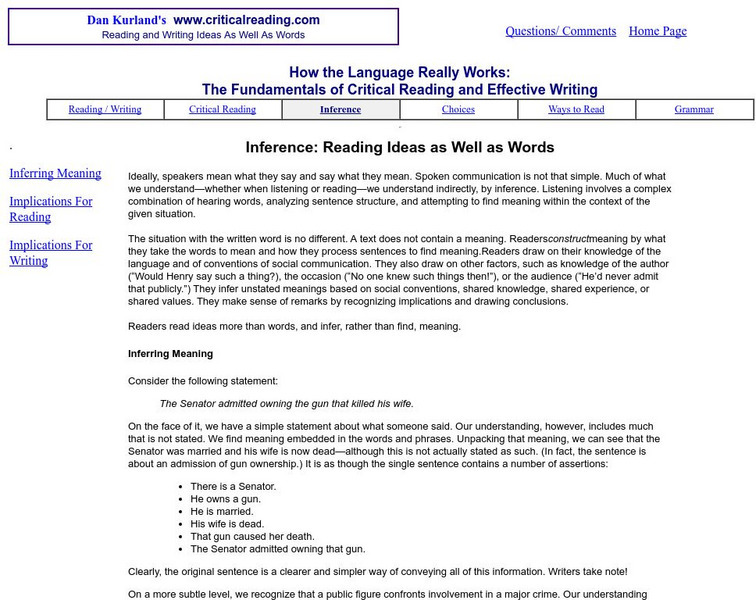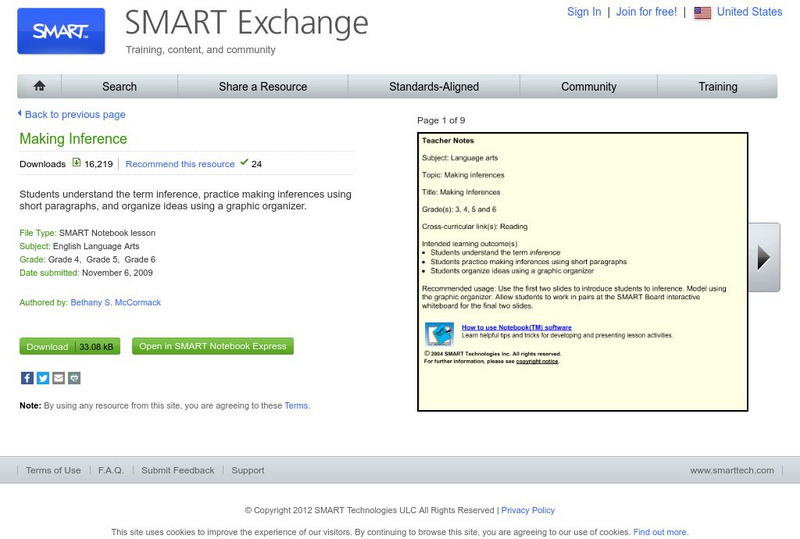William & Mary
Inferential Reading Comprehension Considerations Packet
Don't forget to read between the lines! Educators learn tips and activities to help scholars learn to infer to increase reading comprehension. Activities suggested include think alouds, backwards words, and who's who. the packet includes...
EngageNY
TASC Transition Curriculum: Workshop 6
Is a college education necessary for success in today's world? The class investigates the question, along with others at the end of the sixth workshop in a 15-part series. The lesson has four parts with multiple activities and...
New York State Education Department
TASC Transition Curriculum: Workshop 5
Are video games sports? Pupils investigate this question as well as various nonfiction selections to learn more about claims and the support that defines them. All of the selections mimic the rigor on state tests and encourage close...
New York State Education Department
TASC Transition Curriculum: Workshop 10
How have educational standards evolved? Educators of adults examine expectations in the 10th workshop out of 15 to better determine how standards have grown. Participants respond to a variety of sample questions to determine how they...
Other
Into the Book: Inferring: Using the Clues
Watch an introductory tutorial about inferring during reading, and then choose from several different types of texts to practice using the skill.
Better Lesson
Better Lesson: What the Heck Is That? Inferring the Purpose of an Object
For this lesson, 5th graders use their prior knowledge and inference skills to determine uses of unfamiliar objects. They participate in group discussions and analyze the key information they have in order to reach conclusions.
Curated OER
Mc Graw Hill: 4th Grade Use Details and Examples
This reference from the McGraw-Hill CCCS Literacy eHandbook discusses the importance of recalling explicit details. The importance of inferencing skills with a how-to graphic organizer for making inferences are included. Students may...
Better Lesson
Better Lesson: Using Word and Picture Clues to Make an Inference
First graders will use text evidence to make inferences about word and word phrase meanings in a text. Word and picture clues will be used to help students form inferences.
Better Lesson
Better Lesson: Introduction to Making Predictions and Inferences
First graders will engage in a shared reading of "Mr. C's Dinner" so that we can build a foundation for understanding what it takes to make good predictions and inferences.
E Reading Worksheets
E Reading Worksheets: Inferences Worksheets
In this learning module, students will learn more about making inferences. Worksheets are provided to reinforce the skill of making inferences. This module is designed to support Tier I, Tier II, and Tier III students.
Texas Education Agency
Texas Gateway: Make Inferences in Informational/expository Text
[Accessible by TX Educators. Free Registration/Login Required] In this lesson, you will be taking a look at how authors of informational texts, such as expository texts, organize their writing and the effects that organization can have...
TES Global
Blendspace: Be a Reading Detective! (Inferencing)
A six-part learning module with images and websites that students can use to build inferencing skills.
TES Global
Blendspace: Inference Lessons
An eleven-part learning module with links to images, videos, and websites designed to build inferencing skills.
Austin Independent School District
Austin Independent School: 10 Major Types of Inference in Literature [Pdf]
This printable worksheet helps students recognize the difference between an implication and an inference. Students are presented with quotes from the text and they practice with each of the ten types of inference: location, agent, time,...
University of Illinois
University of Illinois Extension: Character Education "You Tell Me"
Excellent classroom activities for building students' character. Helps with students' comprehension skills, higher-order thinking skills, knowledge and inference skills, grammar and usage. Good resource.
TES Global
Blendspace: Reading Skills Inferencing
A twelve-part learning module with links to texts, images, and videos with information and examples of how to make inferences.
Huntington Library
Huntington Library: Learning From Leaves: From Observation to Inference [Pdf]
A lesson plan in which students explore plants from three different ecosystems and make inferences about plant structures and their environments. Includes discussion questions, a vocabulary glossary, and handouts.
Scholastic
Scholastic: Test Skill Builders for Reading: Making Judgments [Pdf]
Standardized test practice for students in grades 5 and 6. Students read a practice passage and answer questions that require them to make judgments about such things as fact or opinion and the author's purpose. Answers to the practice...
Science Education Resource Center at Carleton College
Serc: Geologic Field Study: Investigating Coastal Features of Lake Superior
In this geologic field investigation, students investigate the coastal geologic features of the western side of Lake Superior, and then develop inferences on the origins of the current coastal features.
Other
Daniel J. Kurland: Critical Reading: Inference: Reading Ideas as Well as Words
This college instructor offers his insights into critical reading and how to develop skills to interpret as well as comprehend the written word. RL.9-10.1, RL.11-12.1, RI.9-10.1 textual evidence and inference.
ClassFlow
Class Flow: Finding the Main Idea & Inferences
[Free Registration/Login Required] This flipchart will help student find the main idea in writing as well as make inferences while reading. There are 2 web quests embedded that has numerous exercises with sound. There is an Activote...
SMART Technologies
Smart: Making Inference
Students will understand the term "inference," practice making inferences using short paragraphs, and organize ideas using a graphic organizer in this SMART whiteboard activity.
SMART Technologies
Smart: Inference and Prediction
Students will learn the difference between making a prediction and an inference as they engage in class discussions about both reading skills, play a game, look at art, and listen to songs.
Other
Ccss Literacy E Handbook: Informational Text: Use Details and Examples
A short explanation of how to use explicit details in an informational text to make inferences. Click on Model at the bottom right to see a model with examples.
Other popular searches
- Teaching Inference Skills
- Inference Skills First Grade
- Reading Inference Skills
- Powerpoint Inference Skills
- Inference Skills in Reading
- Inference Skills Worksheet
- Science Inference Skills
- Inference Skills Sixth Grade
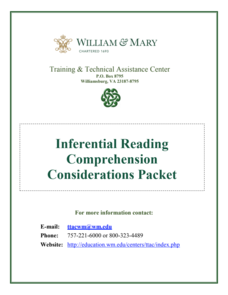
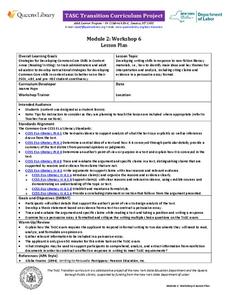









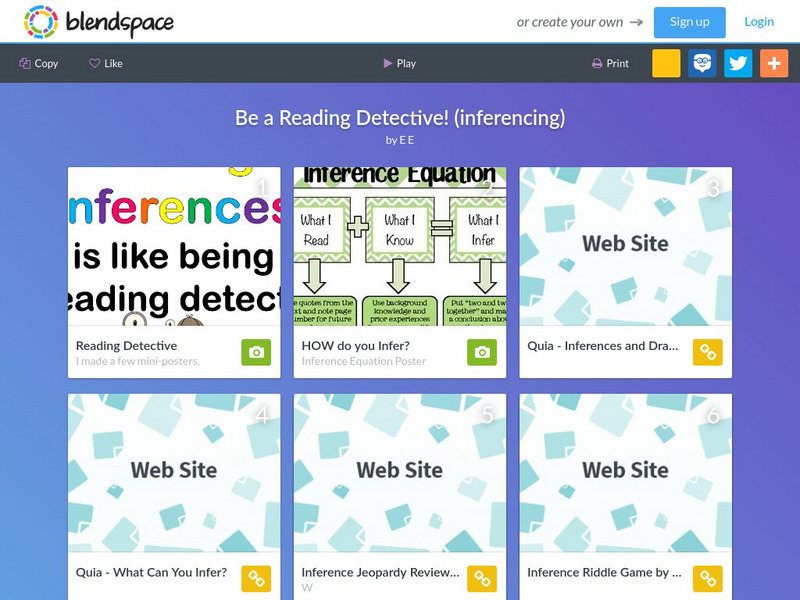


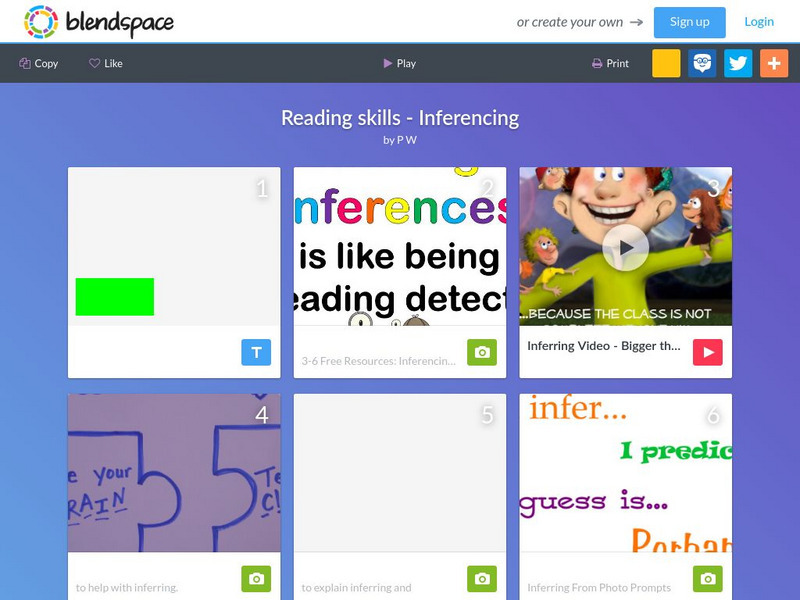
![Scholastic: Test Skill Builders for Reading: Making Judgments [Pdf] Unit Plan Scholastic: Test Skill Builders for Reading: Making Judgments [Pdf] Unit Plan](https://content.lessonplanet.com/knovation/original/480321-6f12644c5ef0c583c0ed15abcd563c89.jpg?1661251115)

